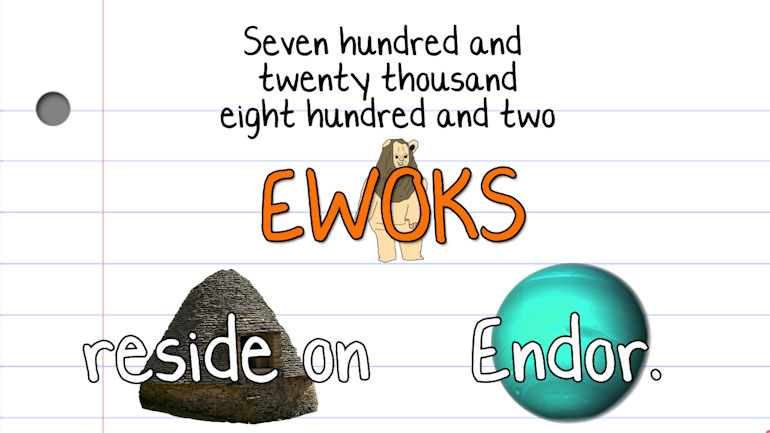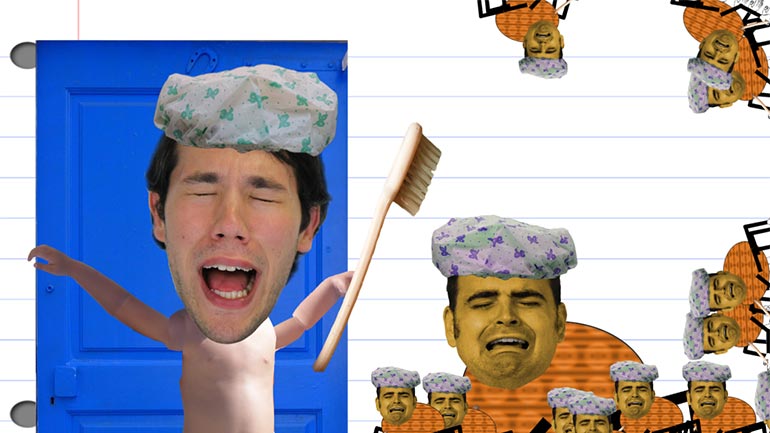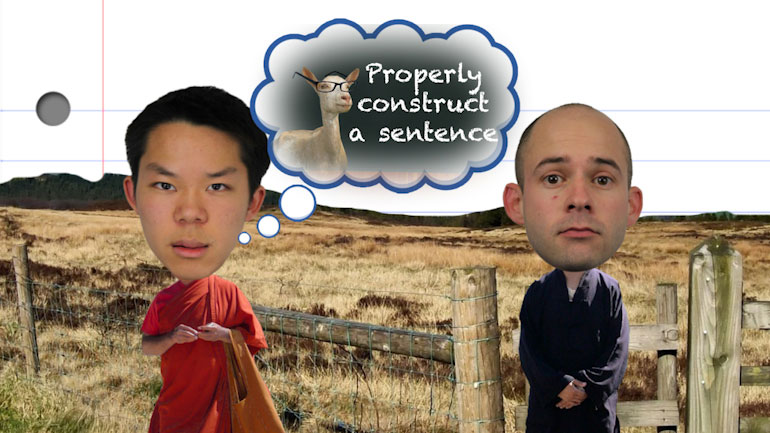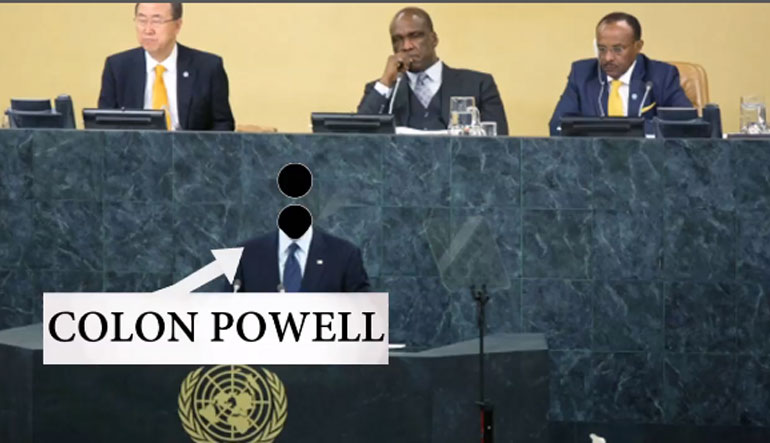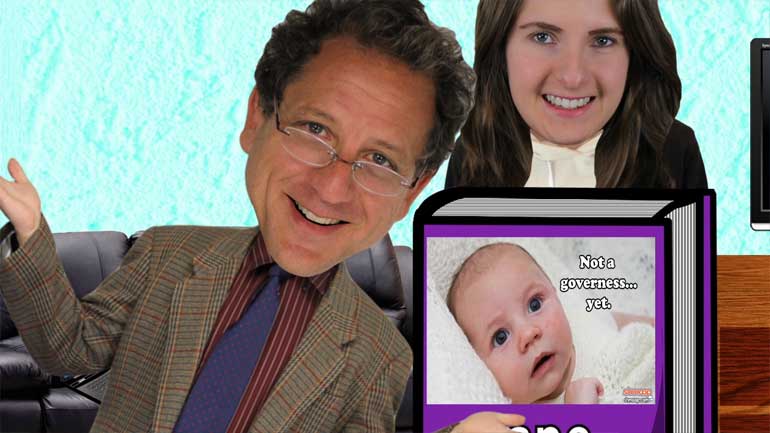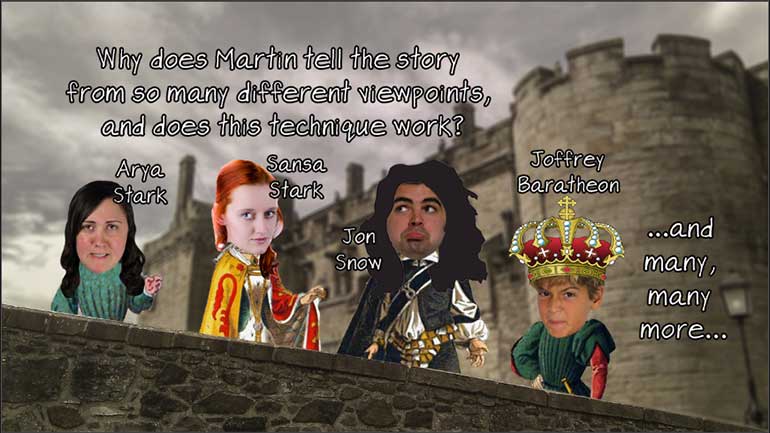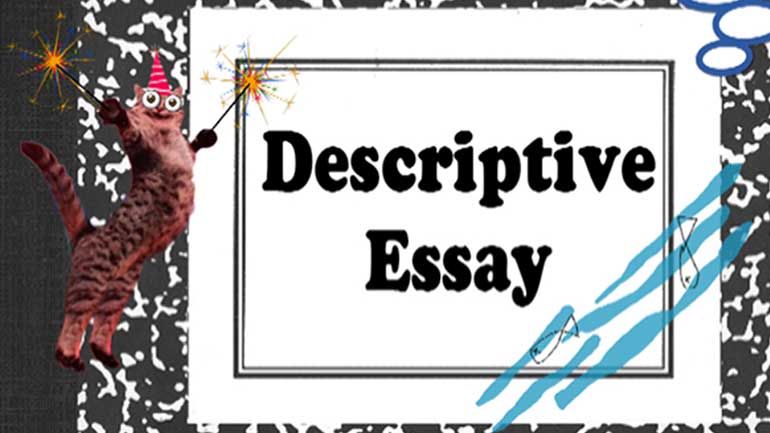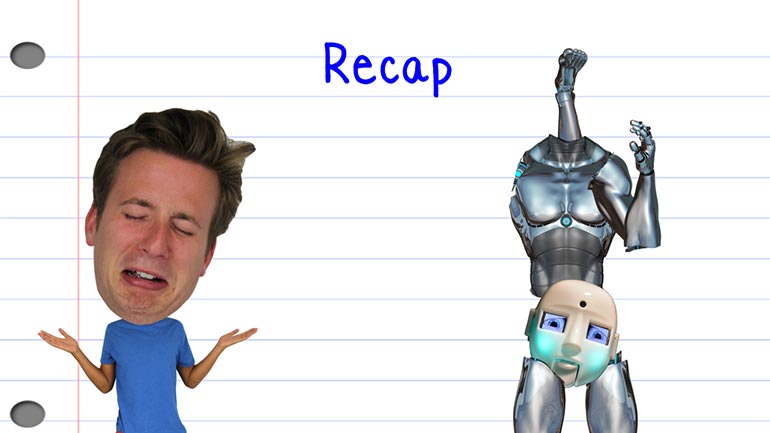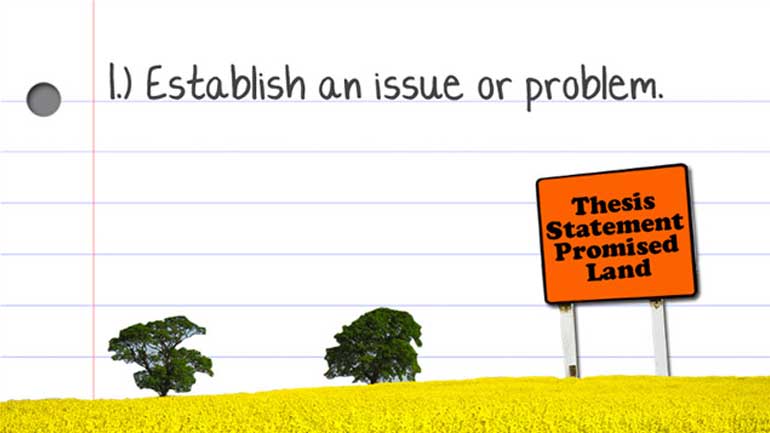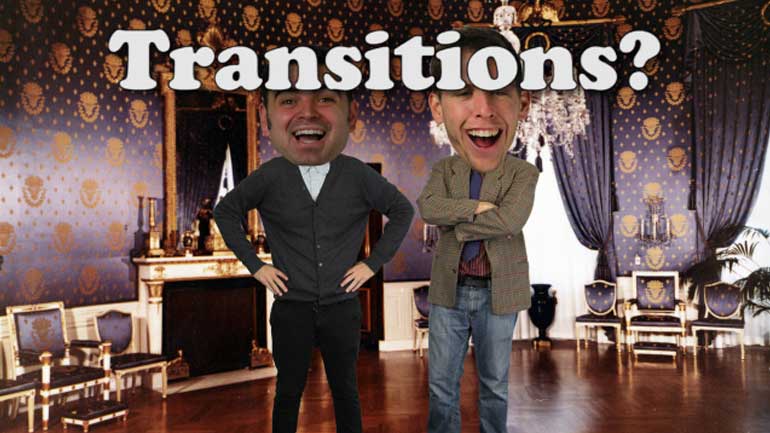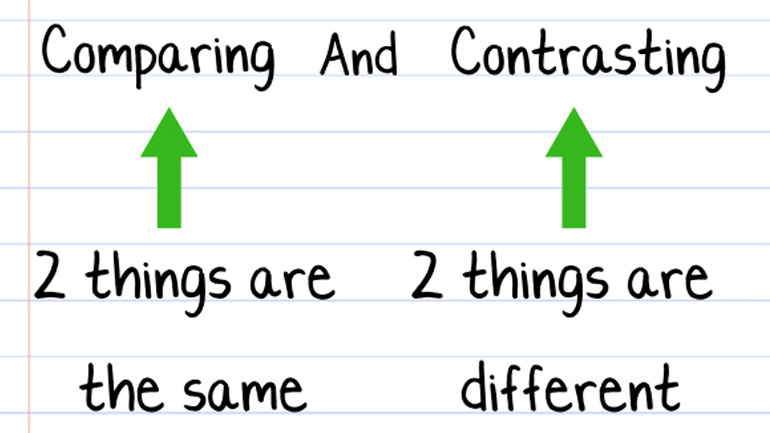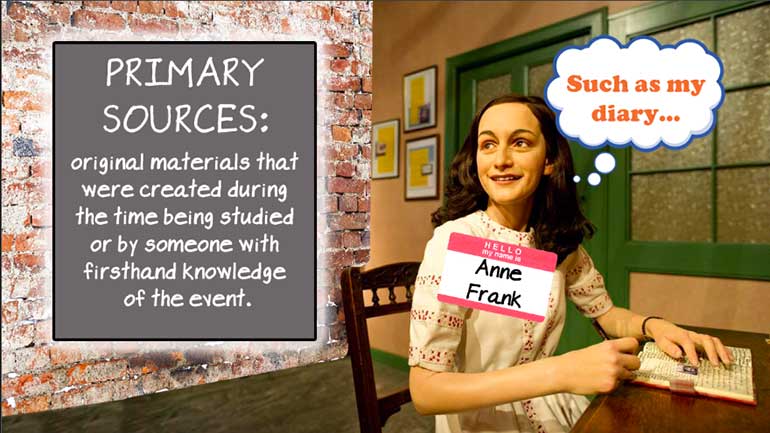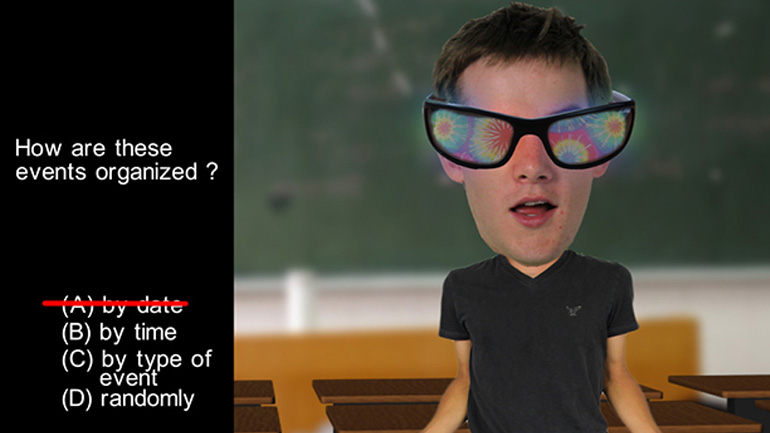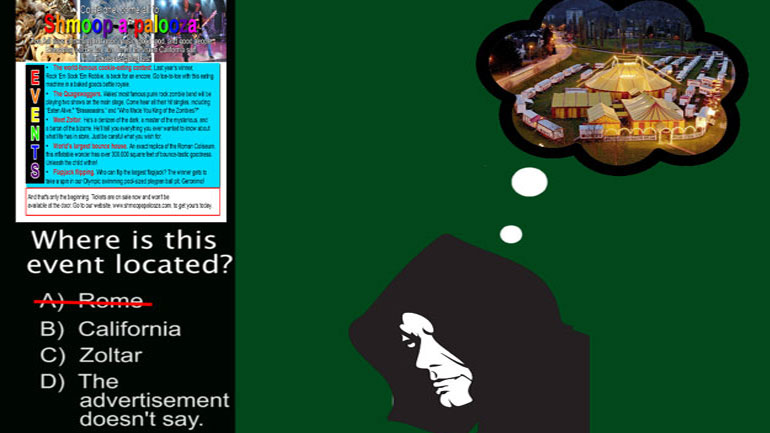ShmoopTube
Where Monty Python meets your 10th grade teacher.
Search Thousands of Shmoop Videos
Essay Writing Videos 71 videos
This video offers some rules of thumb for writing a good introduction. It covers everything from tone (confidence is key!) to phrases and clichés...
Even the best essays can go wrong in the conclusion—this video covers what not to do in a conclusion to help avoid any essay-ending problems. The...
You want to be as picky with your citations as Goldilocks was with her porridge—not too many, not too few... juuust right. You want to prove that...
Writing Skills: Citation 296 Views
Share It!
Description:
Quoting, paraphrasing, summarizing, making your own argument, finding sources...yeah. We know how to get a party started.
Transcript
- 00:02
Citation... (mumbling)
- 00:10
(mumbling) All right...
- 00:17
Well, what's that's the first thing you want to do every time your teacher assigns a
- 00:22
research paper? Groan and throw a temper tantrum? Run and hide? Head
- 00:26
to the library to get a jump start on the project? Well, most likely, you fall
Full Transcript
- 00:29
into one of those first two student types, so clearly, you're not alone in
- 00:33
your agony. Research papers don't have to be stomach-churning, though. Leave
- 00:38
that to roller coasters and new, wild flavors of potato chips. Well, when you know how to
- 00:42
properly cite research, the process of researching can be easy as pie. Mmm, delicious
- 00:48
pie... okay, citation. (mumbling)
- 00:52
(mumble-reading) Uh, this kind of
- 00:56
citation? The one you get for going 115 in a 15? Yeah, no, don't do that. Bad
- 01:01
idea. Citation is also about using other people's work in your own research papers.
- 01:06
That's a real thing, and as long as you do it correctly, it's even legal.
- 01:10
It's like someone else came up with the brilliant thoughts and you just get to
- 01:14
use them. Okay, well, sort of like that there are a lot of rules and
- 01:16
restrictions when it comes to citing other people's work. As I said, you can
- 01:20
totally use other people's work when writing your own speeches, research
- 01:24
papers, or even in poetry or other creative writing. The important part
- 01:28
about using others' work though, is making 100% sure that you're citing it.
- 01:32
Well, there are three basic methods of citation: quoting, paraphrasing, and/or
- 01:38
creating your very own argument. Well, quoting is the most basic but probably
- 01:42
also the one people screw up the most often when you quote a source that means
- 01:46
not only are you using exactly what's being said in the source itself but
- 01:51
you're citing or attributing it correctly well pretend you're going to
- 01:55
write a paper about gorillas you know that they're pretty awesome creatures
- 01:58
but you don't know exactly where on earth they live so you need a source to
- 02:03
help fill in this information gap you head to the library or hop online
- 02:07
whatever and find a great resource from national gorilla quarterly that tells
- 02:12
you everything you've ever wanted to know about
- 02:14
gorillas and even a little bit more in the TMI zone okay anyway this source
- 02:19
gives you the perfect quote that would just really make your research paper pop
- 02:24
and you'll want to use it all right well what do you do well you use it with the
- 02:28
correct citation pretend this was the entire passage that you found if you're
- 02:34
going too far in trying to jungle in La Canada Grill Lisbon spawn in Uganda
- 02:38
Rwanda traveling across your path all right
- 02:42
you don't need all of that info it's too much and strays off course from the main
- 02:46
point you're talking about where the gorillas can be found so you'd pull only
- 02:50
this sentence from the passage right here eastern lowland gorillas I'm
- 02:53
spawning again of a wild mountain gorillas in the nation and you'd work it
- 02:57
into what you've personally written in your research paper you don't want to
- 03:01
just throw random quotes into your papers to a little amateur mistake
- 03:05
instead work to frame the quotes you pull from other sources like so there
- 03:11
are two main kinds of really eastern lowland gorillas found in their borders
- 03:15
into nations and then see the unquote there yeah see what I did there I set up
- 03:19
the quote with a sentence that frames it within the context of the paper that way
- 03:23
my writing and the quote I picked I'll just you know flow together now in order
- 03:27
to make sure you've correctly cited the information you've got to use quotation
- 03:31
marks around the info you stick into your papers this rule is a must
- 03:35
no questions asked if you don't follow it you could be violating copyright laws
- 03:39
and might be accused of plagiarism ie stealing someone else's work and
- 03:43
attempting to pass it off as your own it's pretty much the cardinal sin of
- 03:47
paper writing if you plagiarize even part of a paper and get caught there are
- 03:52
serious consequences like you might fail the class be kicked out of school you
- 03:56
could even be sued for copyright infringement or using copyrighted work
- 04:00
without citing it but it's really easy to avoid all of this scary stress and
- 04:05
frustration just cite your sources that's literally it you're pretty much
- 04:09
free to use whatever you want copyright it or not as long as you give the author
- 04:13
their due credit come on I mean wouldn't we want others to do the same for you if
- 04:17
you wrote a really awesome book and someone decided to steal parts of it and
- 04:21
claim that they were the one who wrote it only you'd probably be pretty P owed
- 04:25
and with good reason it's why
- 04:27
copyright laws exist and why we make sure to cite our resources in our papers
- 04:32
alright last step in the quoting process is to cite the source where you've got
- 04:36
the info going back to our gorilla example let's say you found a quote you
- 04:40
used in an article written by Sally schmooper on page 97 of national gorilla
- 04:46
quarterly you're going to need to include what's called an in-text
- 04:50
citation it's called an in-text citation because it's included in the text of the
- 04:55
paper itself now sometimes you'll have to do in-text citations and a complete
- 04:59
list of all of your references at the end of the paper but that's another
- 05:03
topic for another day back to Sally and the gorillas using the example from
- 05:07
above here's how we write our in-text citation for Sally schmooper there are
- 05:11
two main types of gorillas that may be found in a quote in tournaments and
- 05:14
integrated on a board and you know quote schmooper 97 say we did that notice the
- 05:20
parenthetical citation comes after the quotation marks since it wasn't part of
- 05:25
the actual quote then the period comes at the end of the sentences periods tend
- 05:29
to do and we're done that's it another way of using sources in your paper is
- 05:35
called era phrasing unlike quoting which is just taking someone else's work
- 05:39
plopping it into yours and throwing quotation marks around the whole shebang
- 05:43
paraphrasing is a little different when you paraphrase someone else's work you
- 05:46
rewrite it in your own words but keep the meaning the same as the original
- 05:51
imagine you're writing a love poem about the object of your desire your bay when
- 05:57
you've been dreaming about all your teenage life well you know your writing
- 06:00
skills are taught not but you want to up the ante by throwing in a reference by
- 06:04
some seasoned love expert well you find this amazing quote there is no remedy
- 06:10
for love but to love more the Rove 44 hey that runs that's just back it all
- 06:15
right well you're swooning you want to paraphrase this so you'll rewrite it I
- 06:19
know you were going through a rough breakup but you can get over it by
- 06:23
loving again the row 44 yet now okay well your attempt might not sound quite
- 06:28
as eloquent as the original but it works as a paraphrase because you kept the
- 06:32
meaning intact and even though you switched it up and
- 06:35
puts quote in your own words you've still got to give credit to Thoreau he
- 06:39
came up with the s and after all it might sound tricky to know
- 06:43
when to paraphrase something when in doubt cite it if you have any inkling
- 06:47
that you might be copying someone else's work and not giving them credit just
- 06:52
cite it you know like Nike the third method of citation is creating your own
- 06:56
argument you'll use this method when you write argumentative essays in particular
- 07:00
to present a counterpoint to the point you're trying to make well let's say
- 07:04
you're arguing that school lunches should always include pizza no matter
- 07:08
what no arguments there right well not so fast in order to construct a
- 07:12
compelling argument you've got to consider what the opposition has to say
- 07:15
in this case the opposition says despite rumors of pizzas its own food group is
- 07:20
50 no true tomato sauce is not because of those people who know did you dip
- 07:24
harsh but a decent argument in your paper you're going to create your own
- 07:28
argument using this info like so pizzas not only delicious but it's good for you
- 07:33
according to pizza haters and unmanned Tomatoes Oh blah I all this may be true
- 07:38
there's no law requiring both have nutritional value but it doesn't hurt
- 07:41
your help all right well see what happened there
- 07:43
we framed the quote by using our own information about it before the quote we
- 07:47
mentioned the author's name which is totally legit but we can't leave out the
- 07:51
page where we got the info so it goes after the quote there are tons of
- 07:56
specifics when it comes to citations and if you can't remember them all well
- 08:00
don't sweat it there are references upon references upon references for you to
- 08:03
use to get all the rules down there are different citation styles depending on
- 08:07
what discipline you're writing you for liberal arts and humanities courses like
- 08:12
this one we use something called MLA style MLA stands for Modern Language
- 08:17
Association the reason for using any sort of citation style at all is because
- 08:21
it provides a format for writing papers all papers written in the format will be
- 08:25
consistent and easy for the reader to understand which is important in the
- 08:30
world of academics where people are reading and writing papers all the time
- 08:33
well seriously is there anything else almost it's good to get up close and
- 08:37
personal with the MLA format and it's the one you'll primarily use to write
- 08:42
your papers in English and language arts courses okay now in a nutshell that's it
- 08:46
the basics of citation the most important thing to take away from this
- 08:49
video is that citation is not only important it's necessary
- 08:53
if you want to write credible papers stay in school and you know generally
- 08:58
stay out of jail
Related Videos
Want even more deets on wordiness? Click here to review. Or take a look at our entire grammar section for all the goods.
Want even more deets on tenses? Click here to review. Or take a look at our entire grammar section for all the goods.
Want even more deets on semicolons? Click here to review. Or take a look at our entire grammar section for all the goods.
Asking questions can help spice up an essay. Just make sure you don't get too spicy and forget to answer those questions. You don't want to leave y...
This video defines parallel structure and analyzes what makes it powerful (spoiler alert: sticking to a consistent part of speech, like infinitives...








